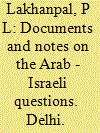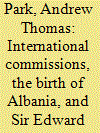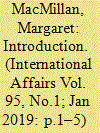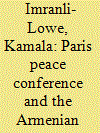|
|
|
Sort Order |
|
|
|
Items / Page
|
|
|
|
|
|
|
| Srl | Item |
| 1 |
ID:
038942


|
|
|
|
|
| Publication |
DelhI, Internation Books, 1968.
|
| Description |
viii, 400p.hbk
|
|
|
|
|
|
|
|
|
|
|
|
Copies: C:1/I:0,R:0,Q:0
Circulation
| Accession# | Call# | Current Location | Status | Policy | Location |
| 001837 | 956.94/LAK 001837 | Main | On Shelf | General | |
|
|
|
|
| 2 |
ID:
170295


|
|
|
|
|
| Summary/Abstract |
During the First World War, France and Britain forged the most intimate and comprehensive political, economic, and military alliance in history. The contributions of Britain and its Empire had been vital to France’s survival as a Great Power. A continuation of the wartime Entente was therefore pivotal to a wider strategy of embedding French security in a trans-Atlantic community of democratic Powers including the United States. But neither Britain nor the United States were ready to commit to using force to uphold the European order established at Paris. British political and policy elites reverted to pre-war cultural reflexes that prioritised Imperial considerations and assumed that France posed the chief threat to British interests.
|
|
|
|
|
|
|
|
|
|
|
|
|
|
|
|
| 3 |
ID:
170290


|
|
|
|
|
| Summary/Abstract |
Recent years have witnessed increasing interest amongst international historians on the influence by experts on foreign policy decision making. Most work thus far has concentrated on American foreign policy since 1945, but this analysis broadens the focus to consider the impact of experts on British decision makers through the use of informal networks below the level of Cabinet ministers whilst debating the future of the city of Danzig at the Paris Peace Conference of 1919. It shows that despite a tendency by the protagonists to interpret their actions as subverting the official role and function of the Foreign Office, sufficient evidence can be found to suggest that through the use of back-channels to David Lloyd George, the prime minister, via Philip Kerr, his private secretary, some officials, such as James Headlam-Morley, within the Office managed to influence high-level decision making at Paris.
|
|
|
|
|
|
|
|
|
|
|
|
|
|
|
|
| 4 |
ID:
170987


|
|
|
|
|
| Summary/Abstract |
International commissions played an important but overlooked role in Great Power diplomacy during the Balkan Wars of 1912–1913. In establishing the new state of Albania, they served as tools of preventive diplomacy that enabled the Great Powers to avoid a disastrous direct confrontation. This analysis examines the use of such commissions and argues that although they succeeded in preventing Great Power conflict in the short-term, their instrumental use opened new avenues of tension amongst the Great Powers and came at the expense of the national principle. The exegesis highlights how the use of commissions developed in the context of situations of malleable sovereignty that occurred in the wake of the receding Ottoman Empire and suggests that understanding the Great Power commissions of the Balkan Wars can help illuminate the use of similar tools during the Paris Peace Conference of 1919.
|
|
|
|
|
|
|
|
|
|
|
|
|
|
|
|
| 5 |
ID:
165027


|
|
|
|
|
| Summary/Abstract |
One hundred years ago the Treaty of Versailles, the centrepiece of a set of treaties and agreements collectively known as the Paris peace settlements, was signed in the glittering Hall of Mirrors in the former home of France's Sun King. For some, the war those settlements brought to an end was a distinct period in international relations, one dominated for the preceding century by a European state system that had endured since the Middle Ages.1 While relations among the Great Powers included a degree of cooperation, even some shared values, the European-based international order at its height in the nineteenth and early twentieth centuries was characterized by a balance of power within Europe and imperialism around the globe.
|
|
|
|
|
|
|
|
|
|
|
|
|
|
|
|
| 6 |
ID:
190961


|
|
|
|
|
| Summary/Abstract |
This article makes an intervention in the study of the May Fourth Movement by examining the role the mass media played in the diplomatic and domestic mobilization processes set in motion by China’s experience at the Paris Peace Conference. In contrast with the mainstream narrative that constructs the May Fourth Movement as a spontaneous response to the loss of Shandong at Versailles, this article shows that it was preceded by a proactive diplomatic strategy to mobilize ‘public opinion’ over the Shandong question. The Chinese delegation’s decision to launch a media campaign in support of their diplomatic agendas at Versailles inadvertently turned domestic media into a platform for political debate. As a result of competition between the political elites who dominated the mediascape, discussions over the Shandong question shifted from focusing on international diplomacy to domestic politics in the spring of 1919. An examination of the ‘media war’ during the May Fourth Movement further demonstrates that the political elites’ variable ability to adopt media strategies to shape and channel public opinion resulted in changing the political landscape of the post-May Fourth era. By focusing on the role of the mass media in the diplomatic and domestic mobilization in China’s strategy at Versailles and during the May Fourth Movement, this article forges new connections between the international and the domestic. It also invites further reflections on the nature of the May Fourth Movement by showing that the media was a tool of political mobilization that connected the political elite to the masses.
|
|
|
|
|
|
|
|
|
|
|
|
|
|
|
|
| 7 |
ID:
138251


|
|
|
|
|
| Summary/Abstract |
The South Caucasus, which includes Armenia, Azerbaijan and Georgia, is one of the most challenging regions in the world, owing to its long-lasting and ongoing conflicts. One of these conflicts is between Armenia and Azerbaijan, the current stage of which has continued for 25 years without any prospect of a settlement in the near future. For a better understanding of this conflict it is necessary to go back to 1918 and 1919, which witnessed the emergence of the first Azerbaijan and Armenian Republics. The article examines and assesses the ethnic, historical, economic, geographical and security arguments submitted by the Armenian government to the Paris Peace Conference in 1919 to substantiate its vision of territorial delimitation between Armenia and Azerbaijan regarding Garabagh. The article argues that Armenian nationalism was ethnic nationalism and that the Armenian government constructed politically motivated arguments to substantiate its claims to Garabagh, which were part of its nationalist aim of constructing an Armenian ‘ethno-nation’ in the area from the Mediterranean to Garabagh.
|
|
|
|
|
|
|
|
|
|
|
|
|
|
|
|
| 8 |
ID:
165037


|
|
|
|
|
| Summary/Abstract |
History has been used—and abused—for centuries. Yet the more familiar notion of ‘history's lessons’—a notion which tends to make most historians uncomfortable, and which surely demands thoroughgoing skepticism—is far from exhaustive of history's uses in the practice and study of international relations. One important and timely subject is the more constitutive role of history in international deliberations over the creation, fragmentation and transformation of nation-states. What follows is a historical comparison of the changing ways in which the past has been used to frame the terms and content of such debates. While we will be exploring the uses of history as a guide or teacher, we propose to examine more specifically and at greater length the growth and persistence of newer uses: first, to bolster claims to independence and territory; and second, in demanding restitution in the form of financial reparations, apologies and other social privileges. By examining the ways in which history was used 100 years ago at the end of the First World War and in recent episodes of the Cold War and post-Cold War eras, we hope to show continuities and differences. What specialists must appreciate is that history is being used and will continue to be used not only within the confines of the academy, but within international society itself, where it may serve as a foundation for arbitrating political disagreements. If anything, non-specialist and popular reliance on history has grown, possibly because other forms of authority have attenuated.
|
|
|
|
|
|
|
|
|
|
|
|
|
|
|
|
|
|
|
|
|